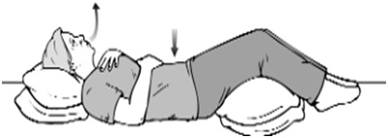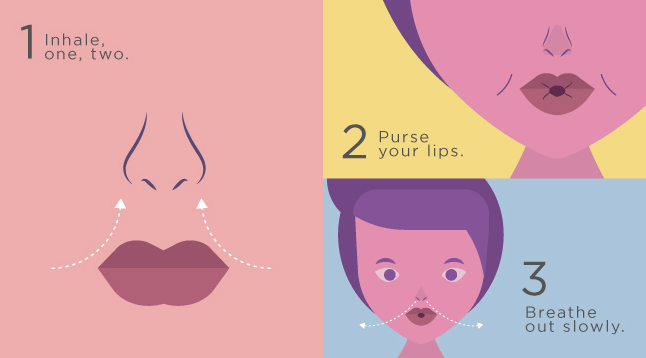It’s a big world of medical procedures and scientific names – and to get to the bottom of your shortness of breath, you’d have to consult a doctor. However, you can try a few tested and trusted home remedies for this to nudge your sinus cavities open and perhaps even clear the congestion in your respiratory system. Here are a few home remedies and breathing techniques you can try to alleviate the worst of the symptoms.
1. Diaphragmatic Breathing Exercise
Diaphragmatic breathing or abdominal breathing is a technique in which you try and hold the chest steady – letting air in and then expelling it from the abdomen – so as to strengthen the diaphragm for better breathing.[2] To perform this breathing exercise:
via Cleveland Clinic
- Lie on your back on a flat surface like a bed with your head supported, and knees bent. Place one hand flat on your chest and the other below your ribs on your abdomen – this will help you feel you diaphragm’s movements.
via Cleveland Clinic 2. Breathe in slowly through your nose – making a conscious effort to keep your chest still and letting your abdomen move.
via Cleveland Clinic 3. Breathe out normally (or use the pursed lip technique as described below) letting your chest move as little as possible.
2. Pursed Lips Technique
The pursed lips technique[3] is another breathing exercise that helps alleviate shortness of breath by improving ventilation and releasing any air bubbles trapped in the lungs. To do this exercise, sit comfortable erect in a chair and relax your neck and shoulder muscles. Breathe in slowly through the nose for two counts, keeping the mouth closed – inhale, one, two. Now purse your lips as if for whistling, and breathe out slowly through the mouth while counting to four – exhale, one, two, three, four.
via healthline
3. Steam Inhalation
Steam inhalation works best if you are short of breath because of cold, nasal congestion or even chronic lung congestion. Inhaling steam[4] helps thin down the mucus and helps you eliminate it by coughing it up, or blowing your nose. There are plenty steamers available at your local pharmacy that get the job done – they are safe to use since the hot water remains covered. If you don’t have a steamer then simply heat water to a boil and put it in a deep bowl, add in some peppermint or eucalyptus oil. Lean in towards the bowl, being careful not to burn your skin from the water or the steam and put a towel on your head to stop the steam for dissipating. Breathe in deeply for a couple of minutes. Repeat once or twice a day.
4. Have Some Black Coffee
Coffee is both a mental stimulant as well as a muscle stimulant. Which is why after a cup of strong, black coffee – you feel both refreshed and energized. Caffeine helps reduce any respiratory muscle fatigue and clears the airway marginally too.[5] However, too much of coffee will increase your heart rate and have the opposite effect – stick to one espresso or coffee to alleviate any shortness of breath.
5. Go The Ayurveda Way With Fennel
According to Ayurveda, fennel is an expectorant, as in it helps you to cough up that mucus from your respiratory system faster, thereby clearing your airways and lungs and letting you breathe to your fullest extent. Fennel[6] also has iron and so consuming fennel will help anybody with anemia get to a healthier iron blood level – and help them avoid being short of breath. You can dry roast fennel seeds in a pan and then chew it down a spoonful when cool – it leaves a pleasantly sweet aftertaste. Else, add in a spoonful to a cup of hot water and let it steep for 10 minutes. Strain and drink up, once a day – sweetening it with honey if needed. Remember to consult a doctor before you try anything in case you are already on medication – and avoid anything you are already allergic to; for an allergy can actually worsen your condition and make you even more short of breath than you were to begin with.



